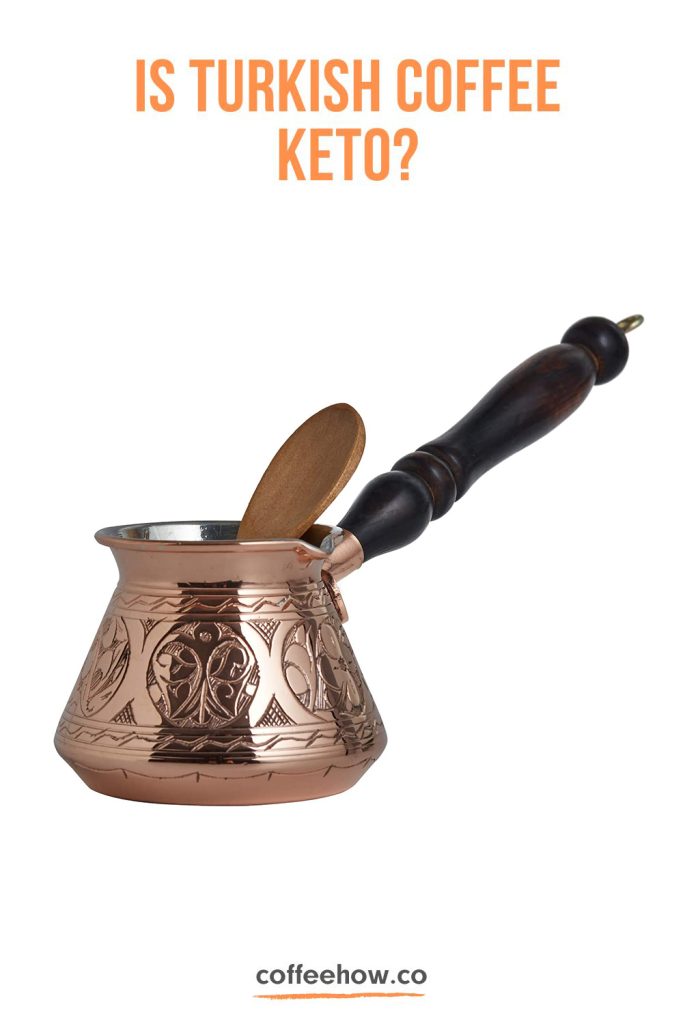Turkish coffee is known widely as one of the best coffees in the world, as…
Coffee is a beverage that is popular in many parts of the world. Whether you want to relax with a book in your favorite armchair or are pouring over notes to prepare for an exam, coffee is the answer to keep you alert.
One specialty of coffee is that there are so many variations of it. Each part of the world has its signature types of coffee, and there are several ways coffee is made and consumed.
One such famous coffee is Turkish coffee. As opposed to its name, this coffee didn’t originate from Turkey, and you’ll learn more about its origin later in this article.
Turkish coffee has health benefits and is also suitable if you’re on a keto diet. It’s because of the low carbs and calorie index of Turkish coffee.
Is Turkish coffee your secret to losing weight on a keto diet? Read on to learn about Turkish coffee and its role in a keto diet.
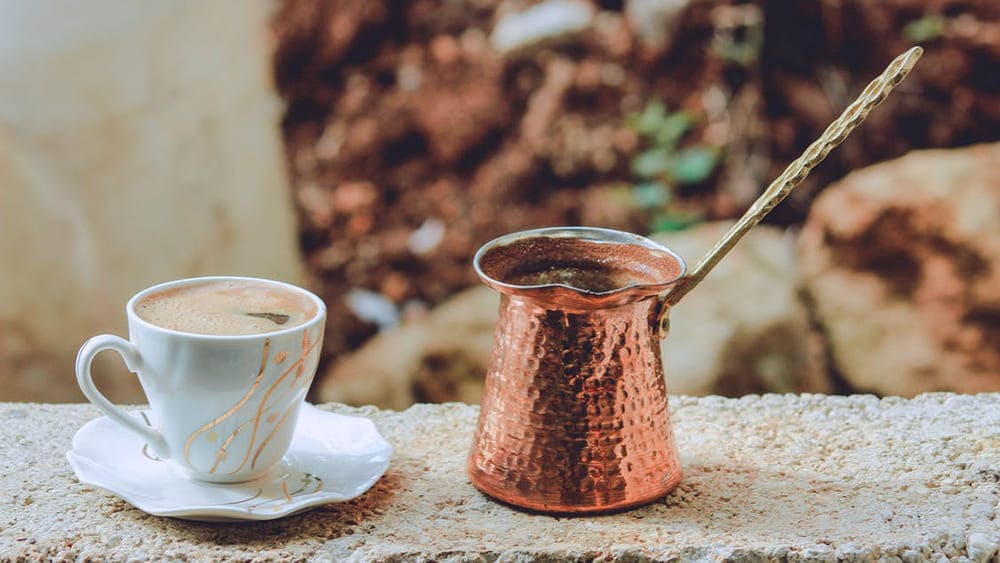
Turkish coffee is a coffee or caffeinated drink made with a unique pot named “ibrik” or “cezve.” It is traditionally made in this pot on an open fire: more on how to make Turkish coffee later.
Turkish coffee is made using finely ground coffee beans and is not filtered before drinking. It’s a strong coffee usually drunk in plain form, without adding milk to it.
Although it’s named “Turkish” coffee, it does not originate from Turkey. It was introduced by an Ottoman governor stationed in Yemen during the 16th century. Therefore, Turkish coffee comes from Yemen.
However, today it’s a famous beverage in Turkey. The Ottoman introduced the coffee to Sultan Suleiman, who then made it famous in Istanbul, Turkey.
Today, Turkish coffee is famous in Turkey, its neighboring countries, and many parts of the world.
There are also many variations of Turkish coffee, such as the Green and Armenian versions.
Unsweetened Turkish coffee has no carbs, making it ideal if you’re on a keto diet. Turkish coffee doesn’t kick you out of ketosis and aids in fat-burning.
Turkish coffee is also known to increase ketone production and boost metabolism, which also helps you to lose weight.
Turkish coffee can help you when on a keto diet. You tend to lose much water weight due to depleted glycogen stores.
It makes you crave more liquids, such as various beverages and drinks. At this point, it’s ideal for sipping on a cup of Turkish coffee because it contains zero carbs, making it keto-friendly.
So, Turkish coffee is beneficial if you’re on a keto diet.
The ketogenic or ‘keto’ diet consists of a diet with high-fat levels, moderate protein levels, and low carbohydrate levels. The keto diet forces the body to burn fat instead of carbohydrates.
The keto diet was introduced as a method to treat epilepsy in children. However, today it’s more popular as a method of losing body fat and weight among people of all ages.
Usually, the body breaks carbohydrates into glucose to produce energy. The keto diet burns fat to produce energy. Therefore, the body doesn’t need glucose as fuel for energy. As a result, keto is beneficial, especially for those with diabetes.
Reducing carbs helps your body achieve a metabolic state called “ketosis.”
Here’s a rough guide on how you should plan a keto diet.
Carb-reduction forces your body to use fats to produce energy, which is what is known as ‘ketosis.’ You need to achieve ketosis to consider your keto diet a success and show results.
When you achieve ketosis, your body uses molecules produced from the liver, called “ketones,” as fuel for energy.
Following a keto diet can benefit you in many ways.
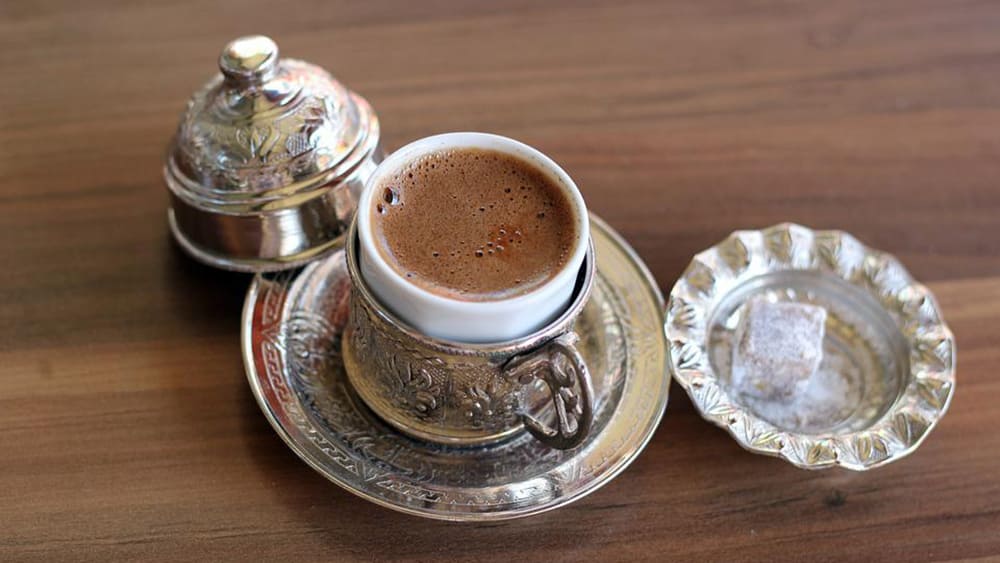
Following are the health benefits of drinking Turkish coffee.
Drinking Turkish coffee can have potential drawbacks, especially if not consumed correctly. Sometimes, people add sugar to Turkish coffee, which can have a negative impact on their health.
Unsweetened Turkish coffee is what has all of the health benefits given above. Occasionally drinking sweetened Turkish coffee is alright for anyone, but doing it regularly is not the best for someone on a keto diet.
Negative health impacts of drinking sweetened Turkish coffee include the risk of being obese and developing type 2 diabetes.
Turkish coffee is high in caffeine, which can have a negative impact on specific individuals. Individuals may experience increased levels of anxiety and sleep disruptions.
Turkish coffee is ideal if you’re on a keto diet and helps you lose fat in the following ways.
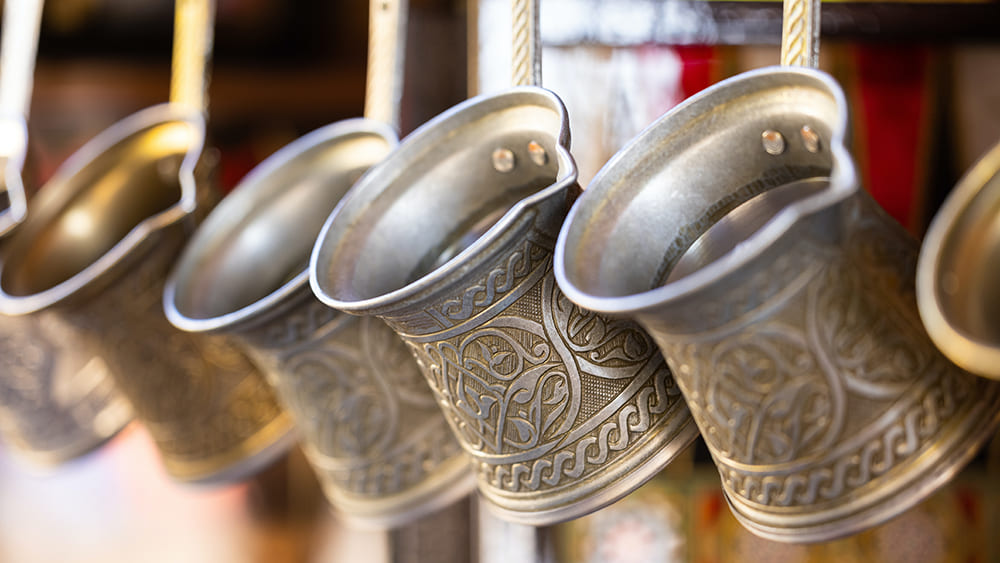
Turkish coffee is rich in caffeine. Therefore, it has a very strong taste, which some might feel is too bitter. Turkish coffee beans are highly-roasted, which is the reason for the very bitter flavor.
Turkish coffee beans are extremely fine and finer than any other coffee bean. Therefore, drinking it without filtering is not much of an issue since a single coffee bean is less than 1mm in diameter.
Another difference with Turkish coffee is that you don’t filter it, so it still contains coffee grounds when drinking.
You also use a unique method to make Turkish coffee, which makes it different from other coffee types. More on this later.
A cup of unsweetened Turkish coffee has the following nutrients.
The above nutritional facts show that Turkish coffee is one of the best beverages if you’re on a keto diet.
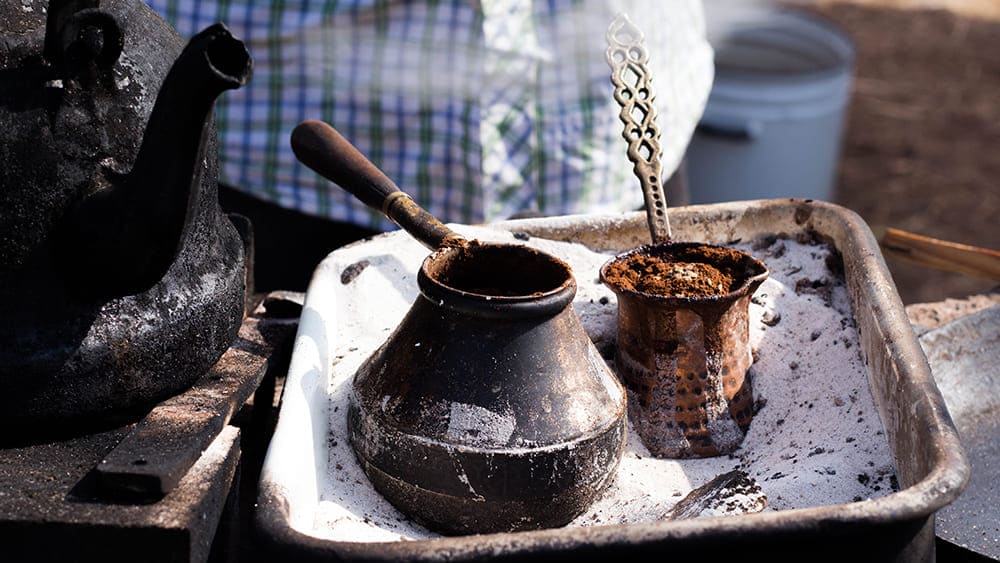
Turkish coffee is prepared using a unique pot named “ibrik” or “cezve.” Here’s what you would want to prepare for a cup of Turkish coffee.
What you need:
Method:
The best way to drink Turkish coffee on a keto diet is to have it without sugar or added ingredients. However, some individuals like variations, at least now and then.
Here’s what you can add to make your Turkish coffee delicious.
However, if you’re on a strict keto diet, you shouldn’t add any extra ingredients to your Turkish coffee if you want to get maximum health benefits from it.
Turkish coffee tastes a bit like espresso, however much bitter than that. It has a mix of roasted, bitter, spicy, fermented, and earthy flavors.
The first time you drink it, you might feel it’s too bitter and not your coffee type. However, with time you’ll get used to the flavor and won’t mind drinking it, considering its health benefits and how it supports your keto diet.
Turkish coffee’s intense flavor sometimes drives many people to drink it, especially coffee lovers.

Turkish coffee has cultural significance in the regions where it’s popular among people. This coffee plays a significant role in ceremonies and events such as weddings and traditional festivals.
Here is where Turkish coffee is famous.
People also use it for fortune-telling by looking at the sludge at the bottom of the coffee cup. In Turkey, Turkish coffee is usually accompanied by a famous sweet of the region, Turkish delight.
If you’re a coffee lover, here’s some good news. Below is a list of different types of coffee you can drink on a keto diet.

Following a keto diet is tricky as you find carbs in many popular dishes and food products. Here are a few tips to follow to reach ketosis when you’re on a keto diet.
Following these tips will help you stay on track and control your keto diet for health benefits.
Following a keto diet can give you many health benefits. Turkish coffee is also part of a keto diet as long as you don’t add sugar or any other calorie-adding ingredients.
Drinking Turkish coffee is a great way to balance your keto diet, especially when you tend to lose a lot of water weight at the beginning.
Turkish coffee is strong and ideal for a die-hard coffee fan. Its unique brewing method is one of the features that makes it different from other types of coffee.
Turkish coffee is a richly-caffeinated beverage brewed using finely ground coffee beans in a unique pot called “cezve.”
Unsweetened Turkish coffee has no carbs.
Any coffee is keto-friendly if you don’t add the big ‘NO’ ingredients to the keto diet. These ingredients include sugar, sweetened creamer, artificial flavoring, etc.
Yes, sugar in your Turkish coffee or coffee will put you out of ketosis.
Turkish coffee is not stronger than espresso. A cup of Turkish coffee has 50 mg of caffeine, while a cup of espresso has 64 mg of caffeine.
Turkish coffee uses finely ground arabica beans.
Turkish coffee is bitter mainly because the ground coffee beans are not filtered before drinking.
